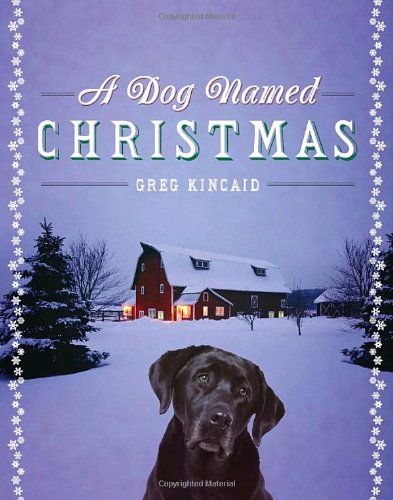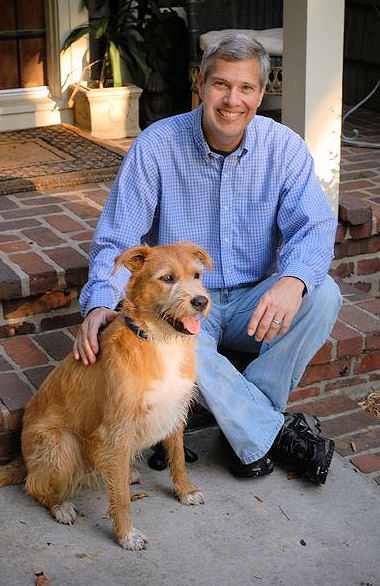 Synopsis:
Synopsis:
Todd was born to George and Maryann McCray late in their lives, after they thought their child-bearing years were behind them. Now 20 years old, Todd lives with them on the Kansas farm that has been in George’s family for several generations. The four older children, their spouses and children, visit frequently.
When Todd was born, the doctors never could agree on a diagnosis for Todd. After awhile, it ceased to matter to George and Maryann because they viewed him as their special gift. “Developmentally challenged” may be the most apt description for Todd’s medical condition, but Todd doesn’t face any challenges when it comes to his capacity to love and care for animals. He is an excellent assistant to his father, performing chores alongside him each day.
When the local animal shelter advertises a special program for the holidays, Todd enthusiastically wants to participate. Beginning December 18, families are encouraged to take one of the animals home for Christmas when the shelter is short-staffed and the animals must remain in their cages. After the Christmas festivities are over, if the family decides that they want to adopt the animal, they may. Otherwise, the animal may be returned on December 26, and again made available for adoption by someone else.
George does not think the idea is so swell, however, because, as he tells Todd, they “don’t need any more animals” on the farm. Besides, he reminds his enthusiastic son, they raise animals “for a purpose. That purpose is to make a living.” When Todd persists, George determines to teach Todd a lesson about responsibility. He strikes a deal with Todd: If Todd cleans his messy room, he will be allowed to select a dog to foster over the Christmas holiday, but the dog must return to the shelter on December 26. George reminds Todd repeatedly, “When does Christmas end?” Todd dutifully responds, “December 26th.”
George, a Vietnam veteran, has experienced two profound life events involving dogs. When he began his tour of duty, he had to leave his beloved Irish Setter, Tucker, behind. And in Vietnam, a dog he adopted made the ultimate sacrifice for him. Since then, he has steadfastly avoided owning a dog.
One very special dog is waiting for Todd to visit the shelter and select him to be the McCray’s Christmas foster dog. In fact, Todd decides to name the dog “Christmas.” And with George’s assistance, Todd even enlists the remainder of the McCray family, as well as their friends and neighbors, to participate in the foster program with the goal of emptying the shelter just in time for the Christmas holiday!
Will Todd learn the lesson about responsibility that George is eager to teach him? Will Christmas be returned to the shelter on December 26th? And whose heart really needs most to be touched by a dog named Christmas?
Review:

The character of George is no longer a young man and, having been wounded in Vietnam, his leg remains, all these years later, stiff and painful. Still, he works hard on the family farm and cares deeply about his family, as well as the family’s roots and connection to their rural Kansas community. George loves Todd unconditionally, but does not make excuses for his disability and feels that Todd must learn a valuable life lesson about being responsible and living up to an agreement once it has been entered into.
When George protests participation in the foster program because the McCray working farm is ostensibly a place where animals are raised for the purpose of earning a living, his declaration is not disingenuous. But George is not fully honest with himself, his wife or his son, either. George was deeply attached to two dogs early in his life and losing those companions impacted him on a deep emotional level; he has never truly come to grips with those losses. His wife, Maryann, the woman who refused to date anyone else while George completed his military duty and married him soon after he returned home, has always stood by him as his life mate and supporter. She soon realizes that George’s proffered reasons for not participating in the shelter’s foster program are a pretext. Still, she wisely lets George work through his feelings, remaining ready to discuss the matter with him when he is ready to open up to her. Theirs is a long-term marriage grounded in familiarity and trust, and a pleasure to glimpse as a reader.
My parents were tremendous animal lovers who grew up on farms in South Dakota during the Depression. Kincaid’s description of his own Kansas upbringing sounds much like what I heard from my parents:
I grew up in rural Kansas with three rules. The first two were easy: Be truthful. Respect others. The third one was harder to figure: Humans on the inside and animals on the outside. Each species had its own unique place. Cows were in the pasture, horses in the paddock and dogs on the back porch or in their doghouse.
My grandfather, a dog lover to the core, would have thought it cruel to keep a dog locked up inside a house, constrained from his dog responsibilities: chasing rabbits, swimming in the pond, howling with the local coyotes, napping under a shade tree, or just waiting for my grandfather to come in from a hard day’s toil in the fields. In his eyes, a dog was innately happier when residing in the wild kingdom.
When I was growing up, I was not allowed to have a dog, even though I begged for one more than once. Among the reasons cited by my parents was their belief that a dog would not have enough room to run freely in our modest-sized backyard. And cats belonged in barns chasing mice.
But there was a darker reason, as well. Shortly after my parents married, their little dog was struck by a car and instantly killed. My mother recalled that incident every time the subject of adopting a dog was broached and it was clear to me, even as a young child, that like fictional George McCray, my mother simply was not ready to work through her painful memories and open her heart to another dog. I swore that the first thing I would do when I established my own home was adopt a pet and, as it turned out, my beloved T.C. adopted me. For 18 years, she slept at the foot of my bed, nibbled my toes through the blankets, and purred loudly as she curled up in my lap at the end of a long, stressful day. Since that fateful day in 1981 when that curious little cat set her sights on my heart, my household has included at least one dog or cat. My children have no idea what it is like to live in a home without pets because they have never done so.
For those reasons, George McCray’s struggle to come to terms with his past traumas, while determined to facilitate Todd’s transition into manhood, rang decidedly true. Christmas, a well-trained, intelligent and, ultimately, loyal dog ingratiated himself into the McCray family’s everyday routines, eroding George’s resistance, hitting another authentic chord. That is, of course, precisely the way dogs and, to a lesser degree, cats are magically transformed into companions we cannot imagine our lives without.
All of his books carry a message “about seeing the world differently and, hopefully, better.”~ Author Greg Kincaid
Kincaid’s tale began as a bedtime story for his children, and then evolved into a short novel. It’s a quick read — easily completed in one sitting — and will hold the reader’s interest from start to finish because of Kincaid’s folksy, plainspoken writing style. The plot never bogs down, in part due to the believable dialogue, especially the conversations George has with Todd and the merciless haranguing to which George is subjected by other members of the family when they are introduced to Christmas and observe him interacting with Todd. Family and friends are shocked that George would actually demand that Todd return Christmas to the shelter, so George guilts them into participating in the program, as well, making it a rousing success.
Kincaid, a native Kansan who grew up on a farm much like the McCrays’, roaming the fields with his faithful dog, takes just the right tone in A Dog Named Christmas. It will definitely bring a tear to the eye of even the most ardent animal-avoider, but Kincaid never manipulates the reader through exaggeratedly emotional tactics or plot developments. Rather, the emotional response to the story of the McCrays springs from the genuineness of the characters and the deceptively simple life they lead. The McCrays are our neighbors, our friends . . . they are us — instantly recognizable characters to whom Kincaid’s readers can relate and for whom they feel an affinity and respect. They are characters for whom readers will wish the very best.
Animal lovers like me already know the moral of Kincaid’s story; readers who have never had their lives enriched through the experience of having a pet will likely be tempted to visit their local shelter in search of just the right one. And that would not be a bad result, because it is Kincaid’s goal that people “realize an ugly truth in America that five million pets go into shelters every year and only half come out. We need to do better.”



4 Comments
[New Post] Book Review: A Dog Named Christmas https://www.jhsiess.com/2010/12/28/book-r…
You sold me with that cover
This is a wonderful story! We didn’t read the book but saw the movie on TV–loved it! Gerard reads a lot of dog stories–his latest is “Last Dog On The Hill” by Steve Duno.
This sounds like such a touching, heart-warming story. I’m thrilled that people are really understanding the variety of ways animals enrich our lives. Our society still has a ways to go to make sure animals are protected from the nasty people but animals are finally beginning to get the respect and understanding they deserve.
Thank you for your review of this beautiful book. I love the cover, too! I’m happy to know you, too, are very much an animal lover.
~ Amy